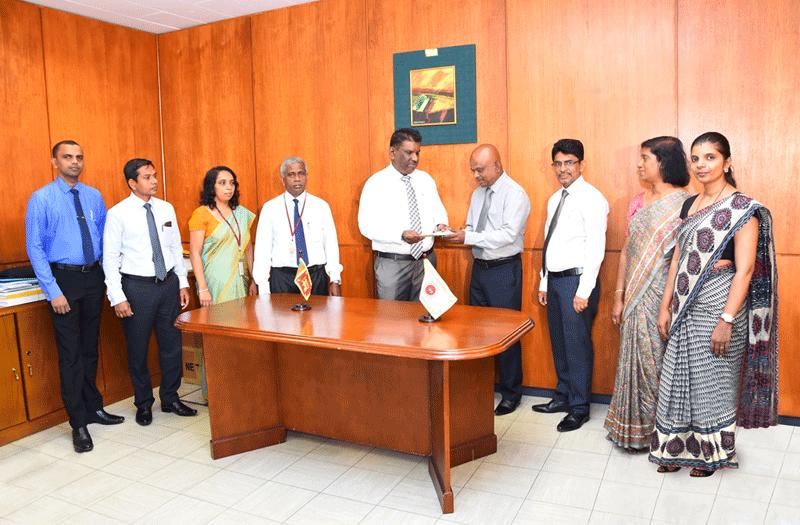Reply To:
Name - Reply Comment

BMIC Chairman J.C. Godakanda receiving the first microfinance license from CBSL Asst. Governor J.P.R. Karunaratne (centre). Also in the picture (from left): BMIC Finance Head Nirmal Priyantha, BMIC Director and Deputy MD Charith Fernando, CBSL Deputy Director Ajani Liyanapatabendi, CBSL Non-Bank Supervision Dept Director W. Ranaweera, BMIC MD Anura Atapattu, BMIC Director Harshini Andridi and BMIC Operations Manager Rajini Yoganathan
Berendina Micro Investments Company (BMIC), the micro-finance arm of Berendina in Sri Lanka was recently granted a license to operate micro-financing by the Central Bank of Sri Lanka (CBSL), a first in the industry under the Microfinance Act No.6 of 2016.
BMIC now will adhere to CBSL’s guidelines as a licensed microfinance company. The license was not just a long standing need for the organisation but also for all the microfinance companies to ensure a healthy microfinance industry in the country.
With this recognition, there are many advantages for clients and Berendina. BMIC can now inculcate the habit of savings among its clientele by taking saving deposits as collateral against the loans. This in turn will help to reduce the cost of funds of the company and further contribute to reducing loan interest rates. Providing the best interest rates to its clientele is one of the primary objectives of the company.
BMIC is owned by Berendina Development Services (BDS), a not for profit organisation which focuses on addressing challenges faced by poverty-stricken communities, and spends around Rs.250 million yearly on these projects. It provides access to clean water, health services, programmes for elders, housing, economic and social infrastructures, value chain developments, livelihood interventions such as inland fishing, amongst others including lobbying and advocacy initiatives for rural and plantation communities.
Berendina also has a third organisation called Berendina Employment Centre (BEC) which targets youth, providing scholarships for Advanced Level education and increasing their employability in the job market.
BMIC operates across 11 districts through 30 branches and 4,600 clusters that consists around 110,633 members. There are almost 100,000 active borrowers with the average loan size being Rs.61,000. The loan portfolio balance outstanding is Rs.2.92 billion. It also has the lowest interest rates among NGOs and private sector micro-finance institutions in Sri Lanka.
The company uses Progress Out of Poverty Index (PPI), an internationally accepted poverty measurement tool, in measuring its clients’ poverty status. This enables to measure BMIC’s outreach to population living under different poverty lines and track their reach out of poverty when they progress from one loan cycle to the next. It’s clients exhibit a reduction in their poverty levels from one loan cycle to the next indicating their improved living conditions and overall wellbeing with the creation of enterprises supported by BMIC micro-credit and enterprise development services and through interventions for useful assets accumulation by those families.
BMIC takes every effort to support their clients reach out of poverty. Unlike many other institutions, BMIC provides enterprise development services such as relevant training, business counselling, marketing advisory and support in addition to many of its social services such as cash benefits during hospitalisation and for funerals. Over 45,000 were trained in 2018 under the enterprise development services.
Going beyond microfinance and enterprise services, BMIC during last year funded 1,157 Bright Student Scholarships (BSS) while its sister organisation BEC provided 1,259 scholarships to the bright students in poor families who are not BMIC clients in the same villages.
BSS provides with monthly cash allowance for the two or three year period for each student for their Advanced Level studies. The value of scholarships provided in a year is over Rs.32 million.
BEC provides employment opportunities through career guidance, vocational and professional training, and are then linked to private sector companies for prospective employment. To ensure this, BEC spends an average Rs.80 million yearly.